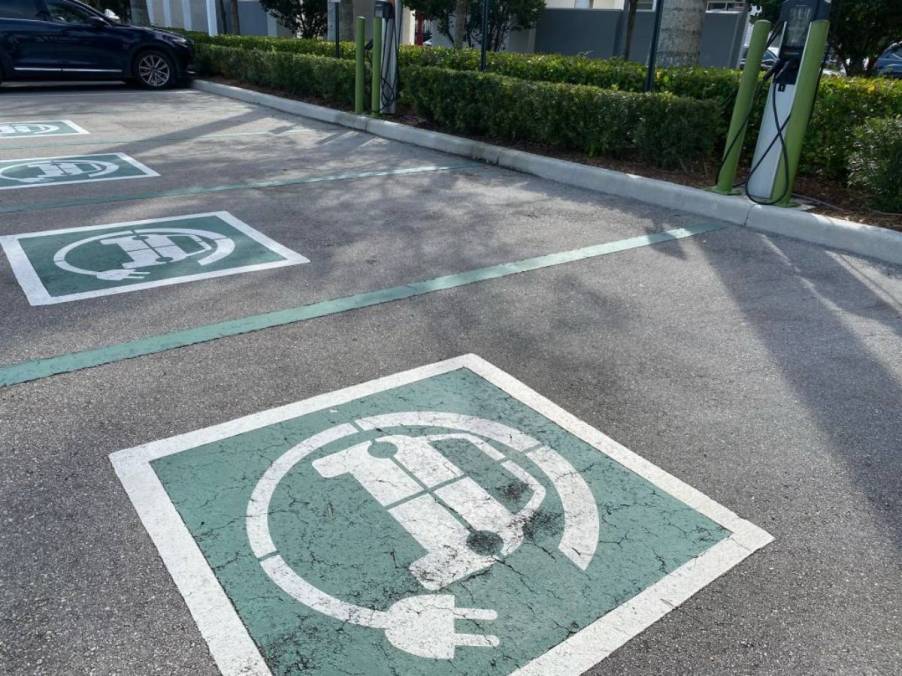
Only 1 American Car Brand No Longer Qualifies for EV Tax Credits
The EV tax credit, also known as the federal tax credit for electric vehicles, is an incentive offered by the Internal Revenue Service (IRS) to encourage consumers to purchase electric cars. However, this credit is not unlimited, and the government has set certain requirements for automakers to be eligible for the credit.
While several American automakers no longer qualify for the full credit, only one American car brand with EVs currently does not qualify for any amount of the tax credit.

Requirements for the new EV tax credit
Under the new EV tax credit requirements, Fuel Economy.gov writes that vehicles must have a battery capacity of at least 7-kilowatt hours, a gross vehicle weight rating of less than 14,000 pounds, and be made by a qualified manufacturer.
Fuel cell vehicles do not need to be made by a qualified manufacturer to be eligible. The MSRP can’t exceed $80,000 for vans, sport utility vehicles, and pickup trucks, or $55,000 for other vehicles.
However, for vehicles placed in service (delivered) on or after April 18, 2023, the credit amount will also depend on the vehicle meeting the critical mineral sourcing and/or battery component sourcing requirements.
A vehicle meeting both sourcing requirements may be eligible for the full $7,500 credit, and a vehicle meeting only one of these sourcing requirements may be eligible for a credit of $3,750. A vehicle meeting neither requirement will not be eligible for a credit.
The IRS states that some models no longer qualify for the EV tax credit because their manufacturer has sold more than 200,000 eligible vehicles, which is the point at which the credit begins to phase out. This is why several American automakers no longer have access to the full tax credit.
Rivian’s R1S and R1T models lose eligibility for the full or partial EV tax credit
Rivian is an American automaker that launched its R1S and R1T electric vehicles aimed at the premium end of the market. However, the company’s vehicles are no longer eligible for any full or partial EV tax credit under the new rules from the US Treasury.
This is because the new rules require that at least 50% of the value of battery components used in the vehicle must be produced or assembled in North America to qualify for a $3,750 tax credit. To qualify for the remaining $3,750 credit, 40% of the value of critical materials must be sourced from the US or a country with a free trade agreement.
Rivian is believed to be affected by the battery sourcing requirement, as its battery cells are produced by Samsung SDI, a South Korean company. Therefore, Rivian’s R1S and R1T models are not eligible for any EV tax credit, even though they are assembled in the US.
Models that no longer qualify for the EV tax credit
The Audi Q5 TFSI e Quattro, BMW 330e, and BMW X5 xDrive45e are plug-in hybrid electric vehicles (PHEVs) that are affected by the new rules. These vehicles have both an electric motor and an internal combustion engine, which can be used interchangeably to power the car.
The Genesis Electrified GV70 is a new electric SUV from Genesis, Hyundai’s luxury brand. The vehicle has been excluded from the list due to the new regulations regarding battery sourcing.
According to CNET, the Nissan Leaf S, S Plus, SL Plus, SV, and SV Plus models are all pure electric vehicles that are no longer eligible for the full tax credit due to battery sourcing rules. The Volkswagen ID.4 was expected to qualify for at least one tax credit.
Lastly, the Volvo S60 (PHEV), Extended Range, and T8 Recharge (Extended Range) are all PHEVs from the Swedish automaker. These vehicles have also been excluded from the list due to the new battery sourcing rules.


